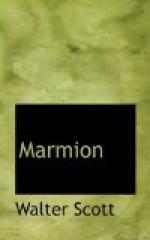The floor to pave, the arch to round,
There never toil’d a mortal arm, 340
It all was wrought by word and charm;
And I have heard my grandsire say,
That the wild clamour and affray
Of those dread artisans of hell,
Who labour’d under Hugo’s spell, 345
Sounded as loud as ocean’s war,
Among the caverns of Dunbar.
XX.
’The King Lord Gifford’s castle sought,
Deep labouring with uncertain thought;
Even then he mustered all his host,
350
To meet upon the western coast;
For Norse and Danish galleys plied
Their oars within the Frith of Clyde.
There floated Haco’s banner trim,
Above Norweyan warriors grim,
355
Savage of heart, and large of limb;
Threatening both continent and isle,
Bute, Arran, Cunninghame, and Kyle.
Lord Gifford, deep beneath the ground,
Heard Alexander’s bugle sound,
360
And tarried not his garb to change,
But, in his wizard habit strange,
Came forth,—a quaint and fearful sight;
His mantle lined with fox-skins white;
His high and wrinkled forehead bore
365
A pointed cap, such as of yore
Clerks say that Pharaoh’s Magi wore:
His shoes were mark’d with cross and spell,
Upon his breast a pentacle;
His zone, of virgin parchment thin,
370
Or, as some tell, of dead man’s skin,
Bore many a planetary sign,
Combust, and retrograde, and trine;
And in his hand he held prepared,
A naked sword without a guard.
375
XXI.
’Dire dealings with the fiendish race
Had mark’d strange lines upon his face;
Vigil and fast had worn him grim,
His eyesight dazzled seem’d and dim,
As one unused to upper day;
380
Even his own menials with dismay
Beheld, Sir Knight, the grisly Sire,
In his unwonted wild attire;
Unwonted, for traditions run,
He seldom thus beheld the sun.—
385
“I know,” he said,—his voice
was hoarse,
And broken seem’d its hollow force,—
“I know the cause, although untold,
Why the King seeks his vassal’s hold:
Vainly from me my liege would know
390
His kingdom’s future weal or woe;
But yet, if strong his arm and heart,
His courage may do more than art.




